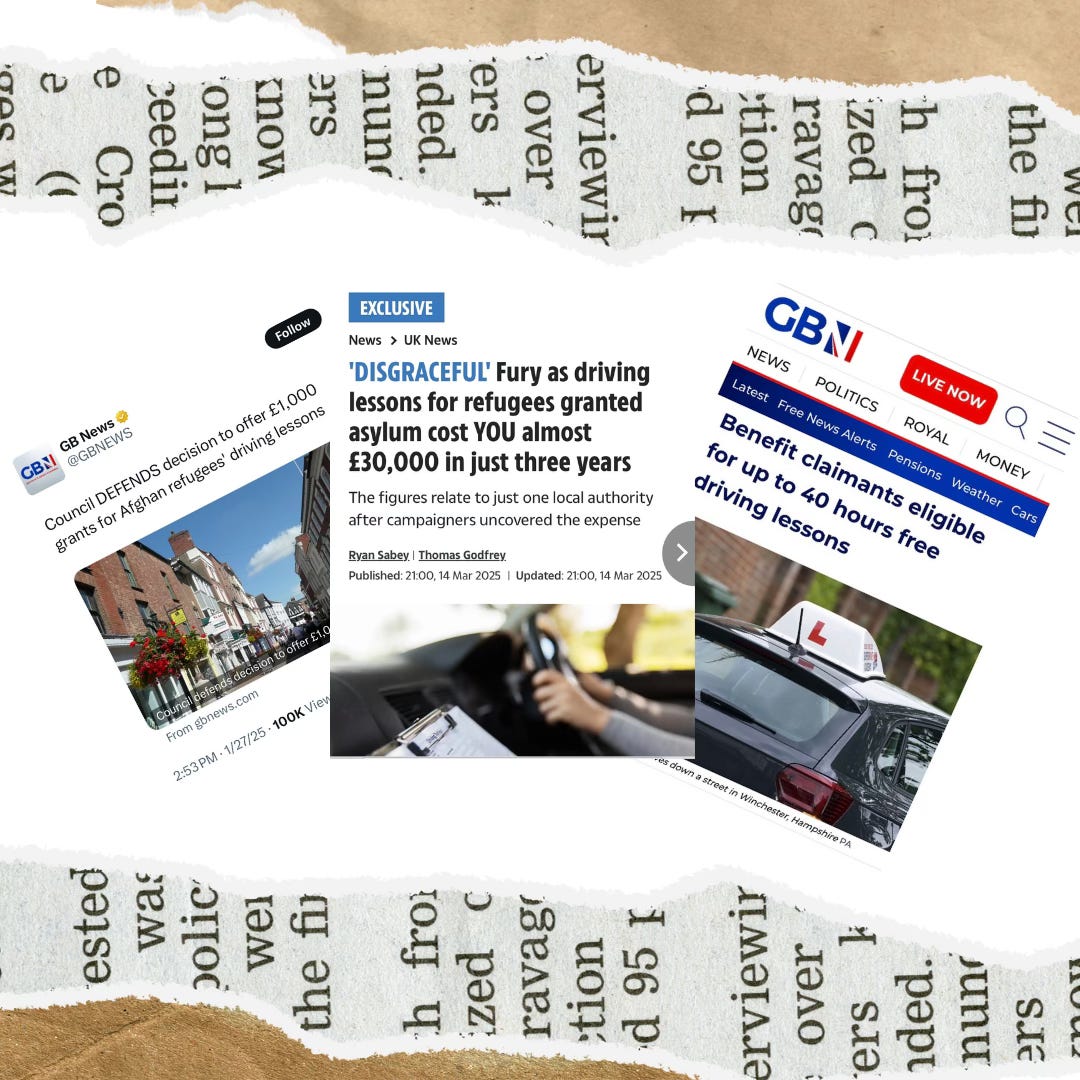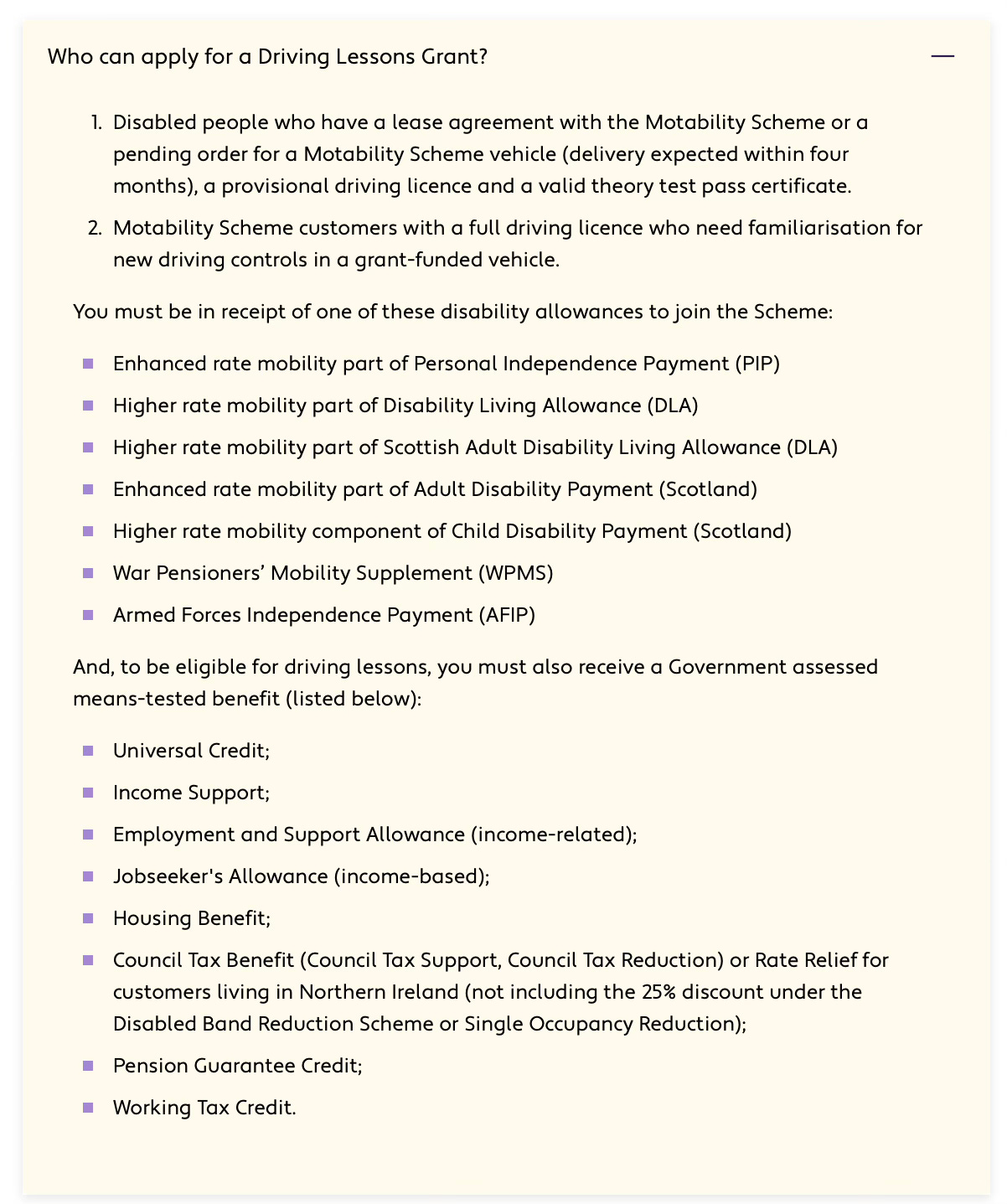Who’s Really Getting Free Driving Lessons?
Behind the headlines: What benefit claimants and refugees are actually receiving, and who’s footing the bill.
Few things provoke right-wing media outrage quite like the idea of someone else getting something for free. Free driving lessons seem to be a major bugbear, and when you throw in refugees or benefit claimants, the headlines practically write themselves.
Benefit Claimants
I first came across this in August 2023 when I saw the headline:
Benefit claimants eligible for up to 40 hours free driving lessons.
It seemed like a reasonable idea to me to help people out of work upskill so they were better able to get a job, but some people seemed very cross that taxpayers’ money might be spent on that.
So I took a look at the details.
The scheme they were referring to was the Motability charity helping fund driving lessons for disabled people who had a Motability vehicle (or were awaiting one). They had to receive both a disability allowance AND a means-tested benefit to be eligible.
The lessons could either teach them to drive or teach people who had become disabled how to use their adapted car.
Screenshot taken from https://www.motabilityfoundation.org.uk/charitable-grants/access-to-mobility-grants/driving-lessons/
Not only does this seem entirely appropriate support, but it is funded by a charity, not the taxpayer.
Here were people getting outraged that a disability charity was using some of its funds to help financially struggling, disabled people’s lives get just a little bit better.
I wrote up my debunk at the time over on Twitter.
So, when I recently noticed a narrative of “immigrants get free driving lessons” popping up, I did a bit of digging.
Needless to say, there is a little more nuance to that statement, so let’s have a look at the facts behind the narrative.
Afghan refugees
In January this year, it emerged that 15 Afghan Refugees in Cherwell had received £14,421 to spend on tuition, of which driving lessons were one option.
This was a very specific fund, not coming from local council tax, but from a ring-fenced fund from the Home Office, only available to Afghan refugees who had risked their lives providing support to the UK defence and security mission in Afghanistan. They had come here legally, been assessed to be at risk of serious human rights violations and persecution as a result of their work with the British, and had been granted Refugee status as a consequence.
These were translators, drivers, etc, who had worked for the British government and were threatened by the Taliban for having done so.
The £1000 grant was to support their integration into British life, as a thank you, and to save the taxpayer in the long term by reducing the demand from refugees for support from other public services.
15 people, who risked their lives to support British troops, had their driving lessons paid for to help them settle in Britain. And that became a media outrage story…
Then came another headline, this time from Kent.
Child refugees
In March, several newspapers ran with the story that Kent County Council had spent nearly £30,000 teaching refugees how to drive.
Was that true?
Yes. And it was also not the whole story.
As in the previous case, this was for a particular subset of refugees.
They were unaccompanied asylum-seeking children who had had their asylum claims confirmed, so were legally living here under their refugee status, and were being looked after by the council.
The funding was provided by the government, and not Kent County Council, and here’s the kicker - this funding is available to all children leaving the care system, not just the refugees.
Apparently, some people were incensed that young refugees, who had arrived alone, had been granted asylum and were in care, were treated the same as British care leavers.
Conclusion
So, despite what the headlines suggest, no one is stepping off a dinghy and straight into a driving school. The reality is far narrower: a few Afghan interpreters who supported British troops, and a few young people leaving care, including some refugees, got modest, targeted support.
Next time you see a headline clearly designed to make you cross because someone else is getting something “for free”, pause and ask…
Who are they?
What are they actually getting?
Why is it available to them?
Who is paying?
Because the answers to those questions will allow you to decide whether it seems acceptable or not.
And maybe you will decide you don’t think it’s fair or reasonable.
And that’s OK.
Because it will be coming from a place of informed judgement and not media-manufactured anger.
Thank you for your continued support to keep writing these newsletters. Please share with others who you think would benefit from reading them.
And if you feel like you’d like to buy me a coffee (or an ice cream this weekend!) that is always appreciated!





Media-manufactured anger is what passes for political discourse in modern Britain.